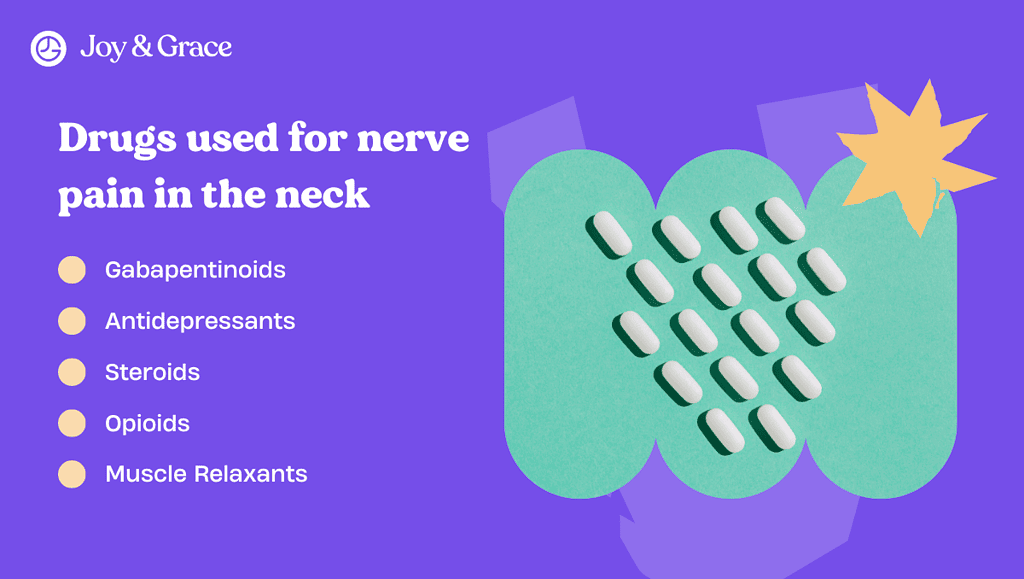All of us will experience neck pain at some point in our lives. According to Alexis Tingan, MD, CAQSM, a doctor at Penn Medicine, “Aches and pains in the spine are just facts of life. They are incredibly common—some estimates say that upwards of 85% of people will experience some sort of back or neck pain.”
While neck pain is usually no cause for concern, it can still be a sign of something serious. One form of neck pain is neuropathic pain, which can result from many conditions. We’ve gathered information from countless journals and articles to help answer your questions on neuropathic neck pain and provide some information on what you can do to relieve it.
What Does Nerve Pain Feel Like In The Neck?

Unlike other types of pain, nerve pain in the neck can come out of nowhere. Most of the time, you may suddenly feel a sharp, stabbing, or shooting pain. Other times, the pain will feel like a burning sensation or an electric shock. The pain can either be persistent or may come and go.
Nerve pain is also unique because it causes “evoked pain.” This is when you feel pain in response to things that generally don't cause it, such as cold temperatures or gentle pressure on the neck. Evoked pain can also mean increased sensitivity to pain.
What’s even more terrible is that neuropathic pain can actually get worse at night. If you think you’ll have a good night’s sleep, then think again. The pressure from lying down, or even the touch of your sheets, can be unbearable. This and colder temperatures can make your nights feel like torture.
The pain is usually not alone, and other sensations may tag along. You can sometimes feel tingling, numbness, or itching in the neck. You may even have the “pins and needles.”
What Causes Neuropathic Neck Pain?
Neuropathic pain, also called nerve pain or neuralgia, is a type of pain caused by nerve damage. It is usually caused by diseases, such as diabetes, that can affect your nerves.
Other causes of neuropathic pain include:
- Trauma or Injury
- Infections such as shingles or HIV
- Cancer
- Alcoholism
- Radiation therapy
- Chemotherapy
These can cause your nerves to be extremely sensitive to pain (hyperalgesia). They can also cause them to send pain signals in response to non-painful stimuli (allodynia). Since nerves are found all over your body, you can experience neuropathic pain anywhere, including the neck.
What Does A Trapped Nerve In The Neck Feel Like?
A “trapped” or “pinched” nerve in the neck refers to cervical radiculopathy. Cervical radiculopathy can also cause neuropathic pain in the neck but in a different way. It is called a trapped or pinched nerve because the nerves are compressed or trapped between soft tissues and bones of your neck. This can cause inflammation and put increased pressure on your nerves, resulting in nerve pain.
Similar to other causes of neuropathic pain, a trapped nerve can also cause sharp, stabbing, or shooting pain. The pain usually runs from the neck to the shoulders and the entire arm.
The pain from a trapped nerve can also cause weakness or numbness, usually on only one side of the body. Well, it’s certainly more than a pinch.
What Causes A Pinched Nerve In Your Neck?
As mentioned earlier, a pinched nerve is due to the nerves being compressed between other neck tissues. There are many reasons why this can happen. One cause of a pinched nerve is a herniated disk or a “slipped disk.” A slipped disk is when the cushion between the bones of your spine slips out of position, which can then press on your nerves.
However, the most common cause of pinched nerves is cervical spondylosis. Cervical spondylosis is when the bones of your neck start to break down due to aging. This causes narrowing of the canals where our nerves pass through, increasing pressure on your nerves, and resulting in neuropathic pain in the neck.
What Aggravates Nerve Pain?

There are some factors that can make nerve pain worse. Some of them you can address right away, while others may need medical attention. These factors include:
According to studies, the hormones released due to stress can make allodynia and hypersensitivity to pain worse. Stress can also cause persistent muscle tension, adding more pressure to pinched nerves.
- Poor Diet
A diet high in sugar can worsen the nerve pain caused by peripheral neuropathies. This is especially true for diabetic neuropathy. Sugar can encourage inflammation and can also directly damage our nerves.
A poor diet can also cause vitamin B deficiency. Vitamin B, especially vitamin B12, is essential in keeping your nerves healthy. Vitamin B12 helps maintain the covering of your nerves and may also help them heal when damaged.
- Alcohol
Alcohol can be toxic to your nerves and can directly damage them. The damage to your nerves due to too much alcohol is called alcoholic neuropathy. Aside from that, alcohol can actually make vitamin B deficiency worse.
- Obesity
Like a poor diet, obesity can also worsen the inflammation responsible for nerve damage. Aside from worsening inflammation, it can also put your spine at risk of breaking down, which may lead to pinched nerves in your neck.
- Inflammatory diseases
This can include diseases like rheumatoid arthritis. These diseases can worsen inflammation, adding more pressure and damage on your nerves.
You may gain some weight during pregnancy. This extra weight may add more pressure on the nerves, resulting in nerve pain.
How Do You Calm Down Neuropathic Pain?

There are easy activities you can do to help relieve neuropathic pain. These include:
- Exercise
Exercise may not be something you’d want to do when you’re in pain, but exercise can be a great way to relieve neuropathic pain.
When you exercise, your body releases endorphins, natural painkillers that may help calm down nerve pain. It can also help address other possible causes of your neuropathic neck pain, such as high sugar and fat levels.
- Aromatherapy Massage
Some studies show that massaging with essential oils like lavender oil can reduce nerve pain in diseases like diabetes. Aromatherapy massages may also help you relax and take your mind off the pain.
- Meditation
Similar to aromatherapy, meditation can also help you relax and relieve stress. Multiple studies have shown that it can help relieve pain from diabetic neuropathy and other causes.
You might be surprised to read that sticking a bunch of needles in your body can relieve neuropathic neck pain, but studies suggest it can. In one study, patients with neuropathic pain from a spinal cord injury felt less pain after an acupuncture session.
The exact reason why acupuncture may help with nerve pain is unknown. Researchers believe it can cause the release of endorphins and may also stop your nerve fibers from sending pain signals.
Although more in-depth studies need to be done, acupuncture can be a safe way to help relieve your neck pain (as long as you can get over the needles). If you want to learn more about acupuncture for neck pain, we have a great article to help answer your questions.
- Sleep
We know we mentioned that nerve pain could make it difficult for you to sleep, but getting a good night’s rest can help reduce your pain's intensity. This is because sleep disturbances can worsen your pain.
So, it’s essential that you practice good sleep habits. This can include having a regular sleep schedule and no screens an hour or two before bed. You may also take melatonin to help you get a deeper snooze.
- Pain Relieving Creams
This includes lidocaine and capsaicin creams. These creams can help provide immediate but temporary relief from your pain. If you do decide to use a capsaicin cream, you may feel an initial burning sensation. This sensation is only temporary and is followed by a longer period of pain relief.
- Minimize Alcohol
As mentioned earlier, alcohol is toxic to your nerves and can cause vitamin B deficiencies, which can cause or worsen nerve pain. So skipping your happy hours may help relieve nerve pain in your neck.
- Vitamin B supplements
Vitamin B supplements can be an easy, inexpensive way of relieving nerve pain. Aside from helping your damaged nerves to regenerate, vitamin B may also relieve evoked pain.
- Therapy
While therapy may not necessarily relieve your pain, it may help you have a better outlook on your condition. Therapy can help you accept your pain, which researchers believe allows you to have more control over your reaction to the pain. It may even increase your pain tolerance, which means the pain won’t bother you as much.
How Do You Unpinch A Nerve In Your Neck?

The remedies for neuropathic pain can also help relieve the pain from a pinched nerve in your neck. You may also combine those remedies with the following:
- Adjusting Posture
Certain positions can actually relieve your pain. This can include sleeping in a fetal position. Try experimenting with different sleeping and sitting positions to find one that can ease your pinched nerve.
You may also change the position of your desk or monitors if you spend most of your day in front of a computer.
- Stretching
Stretching and exercise have been shown to relieve pain from pinched nerves. They work by decreasing muscle tension and strengthening the muscles that support your neck. You can also use neck rollers to ease muscle tension.
You can apply ice packs when the pain is fresh and when there is swelling. Once the initial pain and inflammation have subsided, you can use heat pads to help relieve muscle tension. The heat may also speed up tissue healing. Just make sure only to apply heat for a short period, though, or you might get burned.
What Is The Most Effective Treatment For Neuropathic Pain?
While the remedies mentioned may help relieve neck pain caused by neuropathy, they can only provide short-term relief. They’re best combined with medication or other forms of medical treatment so you can have long-term pain relief.
The first, and arguably the most effective, treatment for neuropathic pain in the neck is treating the underlying cause of your nerve pain. This can be by taking medications for diseases like diabetes, or in worst case scenarios, through radiation or surgery for tumors
Once that is addressed, your doctor may prescribe drugs to help your nerves properly process pain signals.
What Is The Best Medication For Nerve Pain In The Neck?

Although you can take over-the-counter painkillers, they’re not considered effective for nerve pain. However, acetaminophen (Tylenol) and NSAIDs, may help reduce pain and inflammation due to pinched nerves.
There are numerous medications that doctors can prescribe to help treat nerve pain. However, some drugs, namely opioid drugs like tramadol, are only given when your pain is unresponsive to other medications. If you are taking opioid medications, it’s important that you follow your doctor’s orders as they can cause some pretty serious side effects.
Most of the time, doctors prescribe the following for treating nerve pain and pinched nerves:
Gabapentinoids
These can include drugs like gabapentin, pregabalin and carbamazepine.
These are drugs commonly used for treating epilepsy. However, they’re also effective in treating neuropathic pain. They relieve nerve pain by inhibiting your nerves from sending pain signals and by decreasing the release of proteins and hormones that can stimulate pain.
Be careful though- these drugs come with their own side effects:
- Vertigo
- Lethargy
- Swelling of arms and legs
- Blurry vision
- Weight gain
Antidepressants
These can include drugs like amitriptyline, duloxetine, and venlafaxine. Like gabapentinoids, they also inhibit the reabsorption of proteins responsible for pain.
However, these drugs can also produce some nasty side effects, such as:
- Vertigo
- Fatigue
- Dry mouth
- Constipation
- Headaches
- High blood pressure
- In rare cases, amitriptyline may cause abnormal heart rhythms, muscle cramps, and eye pain.
Steroids
Your doctor may also suggest steroid injections to relieve your neck pain. Although you can take oral steroids, they’re usually injected directly into the spine if you have neuropathic neck pain. Steroids may only give immediate, short-term relief, and more studies need to be done regarding their use in chronic neck pain.
Side effects include:
- Weight gain
- Increased sugar levels
- Headache
- Bleeding
- Infection at the injection site
Opioids
These drugs act on receptors in your nervous system that are responsible for pain relief and make you feel pleasure. But doctors only prescribe these drugs when other options fail to relieve your pain.
If you do take opioids, make sure to follow your doctor’s prescription to the tee because they can cause:
- Nausea and vomiting
- Constipation
- Lethargy
- Seizures
- Breathing difficulties
- Addiction
Muscle Relaxants
Remember cervical radiculopathy? You know, the type of nerve damage due to compression or “pinching” of the nerves of your neck? Well, muscle relaxants are mainly used in those cases. An example of a muscle-relaxing drug is baclofen. These drugs help relieve nerve pain by easing muscle tension.
Side effects include:
- Drowsiness
- Decreased urination
- Possible dependence on the drug
How Do You Treat Severe Nerve Pain In Neck?
While the drugs mentioned may effectively treat nerve pain, severe nerve pain can be unresponsive. If you do experience severe nerve pain, your doctor may suggest combining your medication with the following:
- Spinal Cord Stimulation
- Peripheral Nerve Stimulation
- Brain Stimulation
- Cervical Nerve Blocks
- More potent opioids such as morphine or oxycodone. These drugs are only used in severe cases and with extreme caution since they can cause difficulties in breathing. They also carry the risk of abuse and addiction.
- Neurotoxins such as botox
Takeaway
Neck pain is usually a harmless nuisance that we commonly experience in modern times. But sometimes, it can be a sign of nerve damage due to an underlying disease, injury, or even normal aging.
There are many remedies you can use to help relieve neuropathic neck pain. But these remedies are best combined with proper medical treatment to free you from pesky neck pain.
If you are experiencing neck pain, take a look at our heating pad filled with herbs to help you relax and find relief from pain in your neck and shoulders. Also, don’t forget to subscribe to our newsletter to receive updates on our future articles.















